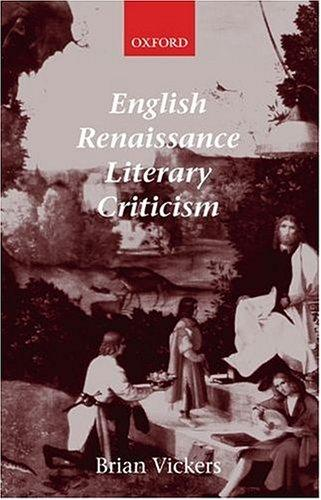

Most ebook files are in PDF format, so you can easily read them using various software such as Foxit Reader or directly on the Google Chrome browser.
Some ebook files are released by publishers in other formats such as .awz, .mobi, .epub, .fb2, etc. You may need to install specific software to read these formats on mobile/PC, such as Calibre.
Please read the tutorial at this link: https://ebookbell.com/faq
We offer FREE conversion to the popular formats you request; however, this may take some time. Therefore, right after payment, please email us, and we will try to provide the service as quickly as possible.
For some exceptional file formats or broken links (if any), please refrain from opening any disputes. Instead, email us first, and we will try to assist within a maximum of 6 hours.
EbookBell Team

0.0
0 reviewsWell-known Renaissance scholar Brian Vickers, author of Shakespeare, Co-Author and In Defense of Rhetoric among other works, has provided a noble service to scholars and general readers alike by compiling a truly useful—and surprisingly provocative—new collection of primary texts, English Renaissance Literary Criticism. The sheer usefulness of Vickers's volume seems undeniable for students old and young of the English Renaissance. The only comparable collections of writings from the period—Smith's Elizabethan Critical Essays (Oxford: Clarendon Press, 1904) and Spingarn's Critical Essays of the Seventeenth Century (Oxford: Clarendon Press, 1908)—have been long out of print, with the consequence that this rich and fascinating body of writings has proven rather inaccessible, especially for classroom use, though one wonders if higher study of English Renaissance literary criticism and the rhetorical culture supporting it has not likewise been limited or stunted, something Vickers suggests at several points in his thorough and illuminating general Introduction. Vickers's book features thirty-six expertly edited and gracefully modernized selections from the best known critics and writersfrom 1530-1650 (e.g., Elyot, Wilson, Ascham, Gascoigne, Spenser, Puttenham, Sidney, Shakespeare, Jonson, Heywood, Bacon, and Milton), as well as some lesser known gems, including DudleyNorth's critique of obscurity and crabbed complexity in metaphysical love poetry (504-11), and the never-before-published elegy by John Ford, "To the Memory of the Late Excellent Poet John Fletcher" (541-45), discovered in recent years at the William Andrews Clark Memorial Library, Los Angeles, by the late Jeremy Maule. I should add that it is refreshing and somehow comforting too to learn via the selections from Thomas Hobbes on epic poetry (607-25) that, while the author of Leviathan saw life as "solitary, poor, nasty, brutish and short," he did also see in epic poetry the high purpose of stirring "admiration, principally, for three virtues: valor, beauty, and love" (619). Vickers's vigorous arguments about the theoretical and practical coherence of the period in his Preface and lengthy Introductionwill be of the most interest to academic readers of the collection. Vickers's positions seem designed to provoke some controversy, perhaps especially among those readers and critics inclined to see inchoateness and irregularity alone in the productions of the Early Modern period, with its whirligig of discourses and energies, among which it seems at times that "Chaos umpire sits, / And bydecision more embroils the fray / by which he reigns" (Paradise Lost, 2.907-11). Vickers first distinguishes his collection from the earlier ones by noting that the last fifty years of critical work have vastly improved our understanding of the importance of rhetoric for "both the creation and reception of literature" in the English Renaissance (vii). In Vickers's view, these advances point to the first of two key claims that inform his whole collection: "Writers of poetry, drama, even prose fiction, took account of the precepts of rhetoric while composing their works, as did readers and critics evaluating them. In effect we are dealing with a truly homogeneous culture, in which theory and practice interlocked" (vii, emphasis added). The consequences of this claim for our understanding of literary theory in the period lead to Vickers's second bold claim, something he argues has been overlooked by critics: "Contrary to the opinions of some modern scholars, writers in this period had a perfectly coherent theory of literature. It, too, derived from rhetoric, the branch known as epideictic, in which orators praised virtue and attacked vice" (vii, emphasis added).